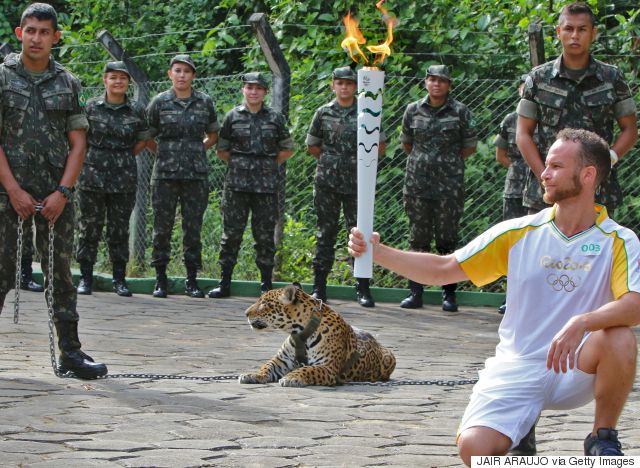
Yet again we face a tragedy involving captive animals. After an Olympic torch lighting event in Manaus, Juma a 17-year-old jaguar was shot and killed.
According to a statement issued by the military, the jaguar escaped as she was being returned to her cage shortly after the event. After being shot with tranquilizers, ineffectively, the animal eventually moved towards a soldier, at which point the jaguar was shot in the head and killed -- in order to preserve human life, according to the military.
This is a shameful incident, and reactions have been reverberating across the globe, mainly because the species is the symbol for the Olympic Games in Rio de Janeiro this August.
We must discuss two issues. We should begin by addressing this specific case, and then talk about the confinement of wild animals.

Although we don't have detailed information about what happened, one thing is clear: If the jaguar did in fact escape, someone made a huge mistake. We are talking about a predator that poses risks to human life under stressful situations. An event involving fireworks and excessive noise isn't a suitable environment for a wild animal of this size. How did she escape the enclosure?
The main line of inquiry should not focus on why the animal was shot, but rather what happened leading up to that unfortunate moment.
Regarding the shooting, despite the controversy, if there was actually a risk to human beings, sadly there was nothing else to do. I strongly believe that the decision was a tough and painful one, because the military men seem quite fond of their animals. But the main line of inquiry should not focus on why the animal was shot, but rather what happened leading up to that unfortunate moment.
What sequence of mistakes led to this tragic ending? We must have more detailed information about what happened during its chase. A tranquilizer shot could cause more stress to the animal. We must find out if the person responsible for preparing the chemical mix used the right dosage, and if the soldiers had been prepared for this type of incident. We must also find out if the safe distance between the military men and the animal was respected when the jaguar was shot. We would like to believe that both answers are affirmative, but military agencies must give us further information.
This tragedy joins a list of other incidents, such as the case of Harambe, the gorilla who died in the Cincinatti Zoo, and the lions shot dead in Chile after a man had entered the cage to commit suicide.

Some of these incidents have raised a heated debate about whether or not zoos are necessary. First of all, we must say that zoos fulfill a very important function for the conservation of wildlife. Apart from the obvious function of environmental education, the breeding programs and the genetic studies done on animals in captivity result in material of immeasurable value for the reintroduction of species and fauna recovery programs. In addition, zoos are responsible for funding wildlife conservation projects worth hundreds of millions of dollars.
Backing the extinction of zoos comes as a result of a mix of romanticism and total misinformation. We obviously need to discuss the practices of many establishments, but that does not justify the complete elimination of this activity.
I can't help but wonder: What is the message conveyed by exposing a live animal as a mascot in front of a crowd?
In the case of Juma, however, the debate must go way beyond that. Although Brazil's Jungle Warfare Instruction Center (CIGS) keeps a zoo for animals rescued from hunting and trafficking, many of which cannot be reintroduced into nature, I can't help but wonder: What is the message conveyed by exposing a live animal as a mascot in front of a crowd?
Could it be a message of environmental education or protection? I don't think so. For me, the message conveyed is that of the domination of human beings over animals, clearly illustrated by the picture of the two military men holding Juma by a chain. We must reconsider, and decide if this kind of conduct is appropriate.
I am not saying that to keep these species domesticated or in captivity is always a mistake. Not all "domination" is bad. The Onça Pintada Institute (Jaguar Institute), coordinated by Dr. Leandro Silveira, is an exemplary institution that, besides conducting field research, leads excellent activities for captive jaguars, most of them orphaned due to hunting practices. The Jungle Warfare Instruction Center itself keeps wild animals for protection purposes and is therefore praiseworthy -- but that is not enough. Public display, especially in these conditions, does not seem appropriate. If one must take further actions, the most important would be to enable CIGS to reintroduce such species into nature.
I hope this sad incident can inspire change. Ideally, all this uproar about a single animal should also be used to mobilize society at large to protest against the reduction of the population of this species. In just 30 years, we have lost 27 percent of our jaguars. Many Jumas, sadly, remain invisible.
This post first appeared on HuffPost Brazil. It has been translated into English and edited for clarity.
